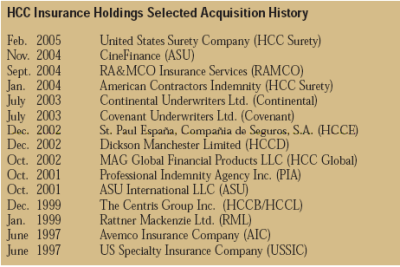Steve Way Has Built Giant HCC Holdings Via Acquisitions and He’s Not Done Yet
Managing general agents and program administrators have an admirer with deep pockets in Steven Way.
Getting some of that money might be one reason for an MGA to sell out to Way, who is chairman and chief executive officer of Houston-based HCC Insurance Holdings Inc.
Way discussed the reasons entrepreneurial MGAs might like to sell and why his company likes to buy MGAs during his keynote address at the 2005 Target Markets Mid-Year Meeting in Baltimore.

Acquisitions is a subject with which native Londoner Way has some experience, having completed 29 deals in the last dozen years, some of them relatively small acquisitions of specialty firms.
When he started Houston-based HCC Insurance Holdings Inc. in 1980 by converting what was then Houston Casualty Company, the firm had a mere $750,000 in capital and no A.M. Best rating. Today, Way sits atop an international holding company and a leading player in specialty insurance markets around the globe. HCC Holdings boasts total assets of $6 billion and gross premium of about $1.9 billion, up from just $25 million in 1992. It also has an A+ (Superior) rating from A.M. Best and AA (Very Strong) from Standard & Poor’s.
Acquisition strategy
A large part of Way’s company’s success can be traced to its acquisition strategy. HCC’s acquisitions have given it a strong presence in various lines, from aviation and energy to directors and officers liability and disability for sports and entertainment figures.
Way doesn’t apologize for the size of the acquisitions that have helped his firm prosper.
“Although some of these transactions are small, they represent meaningful contributions to our business plan and we intend to continue with this philosophy of accumulating complementary specialty insurance operations, which has been so successful to the formation and growth of HCI,” he wrote in his most recent shareholder letter.
The strategy makes sense for a number of reasons. “Growing our business through acquiring small specialty insurance operations has greatly increased our distribution network, and done so at a relatively low cost. Also, by moving into business with lower policy limits and premiums, we have become considerably less reliant on overly competitive ‘national accounts’ and are able to retain substantially more premium due to the lack of volatility or catastrophe exposures. We plan on continuing this strategy,” he told shareholders.
“It’s a good way to grow. … We acquired managing general underwriters to get growth premium and distribution without assuming any liabilities,” is how he explained the strategy to the Target Markets audience.
Buying ‘soft goods’
While he is buying MGAs and its operations, what he is really after is the so-called “soft goods” of talent, experience and ambition.
“By buying managing general underwriters, we get the entrepreneurial spirit. We buy talent, the soft goods. We’re continuing to buy them. There’s more talent in managing general underwriters than there is in insurance companies. Most big companies don’t have good underwriting talent,” Way stated.
Buying MGAs can make more sense than buying insurers, in his view. “Underwriting agencies do everything an insurance company does, only better, and they don’t need capital and they don’t take on liability.”
When considering an acquisition, Way steers away from workers’ compensation and general liability lines. He prefers mature books in niche businesses where the agency can be number one in a market.
“We look for areas where people have a market niche. It might even be a tough business, but that doesn’t make it bad,” he said, noting that his company writes helicopters in Egypt and air force stations in Iraq.
While he values experience, it must be the right kind. Way tries not to confuse experience for expertise. “You may do it for a long time, but not be any good at it,” he said.
Premium growth is not always a sign of a good deal, he added. “We look for consistent underwriting approach. It’s okay if the volume goes down in soft markets. We like that discipline.”
He looks to see that there are long relations with producers and clients, and he definitely likes management continuity and wants the managers to remain after the buyout.
Motivations for selling
While buying MGAs makes sense to Way, it may or may not make sense for MGAs to sell. Money is, of course, one key motivation.
“The other reason people like MGA entrepreneurs sell is they get the kicks from doing deals. It can also allow you to go to the next level. You get the capital and the systems that HCC has so you can have a chance to grow to the next level,” Way contended.
He said that while HCC wants the entrepreneurs to run their own businesses after being acquired, selling helps solve the dilemma of succession for the MGA.
Selling might also provide some stability. “Underwriting agencies get a bad rap for not being consistent. Well, once we are with them, the consistency issue is solved,” he noted.
If selling is the right thing to do, why sell to HCC?
“We are a specialty company. We do what you do,” offered Way.
Topics Excess Surplus Talent Underwriting Insurance Wholesale Training Development
Was this article valuable?
Here are more articles you may enjoy.


 Florida Engineers: Winds Under 110 mph Simply Do Not Damage Concrete Tiles
Florida Engineers: Winds Under 110 mph Simply Do Not Damage Concrete Tiles  US Supreme Court Rejects Trump’s Global Tariffs
US Supreme Court Rejects Trump’s Global Tariffs  Insurify Starts App With ChatGPT to Allow Consumers to Shop for Insurance
Insurify Starts App With ChatGPT to Allow Consumers to Shop for Insurance  Experian Launches Insurance Marketplace App on ChatGPT
Experian Launches Insurance Marketplace App on ChatGPT 


